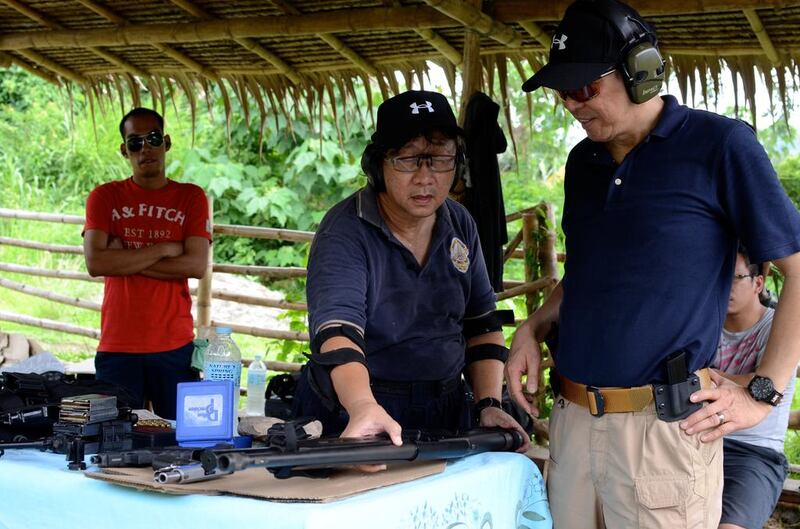CALAUAN, PHILIPPINES // Father Salvador Pablo picks up a shotgun loaded by his assistant. He brushes back his scraggy black hair, peers through his oversized glasses, cocks the gun and takes aim.
As he fires his first shot, he dives into a forward roll, followed by a second shot another roll and a final pull of the trigger.
A dead shot with a love for guns and motorbikes, Father Pablo, known as Father Boy, is not your average Roman Catholic priest.
When he’s not giving mass, he trains the victims of the Philippines’ natural disasters in shooting, hostage negotiation and emergency response.
Father Boy is one of the residing priests at Southville 7, a sprawling government relocation site south of Manila for those who lost their homes to typhoons and slum clearances.
As well as providing the site’s residents with spiritual learning and growth, Father Boy trains people to work in security.
“People find leverage in having their own honest living instead of being caught by the police because they stole. We just divert their energies to work in something worthwhile like defence. Now they have a higher level of living,” says the priest as he lays out his array of guns including an M16, shotgun and a .45 handgun.
In relocation sites such as Southville 7, unemployment is one of the biggest issues.
The land houses 6,400 families including victims of Typhoon Haiyan which hit the Philippines in November killing more than 6,000 people.
The unemployment rate at the site is between 20-30 per cent for men and 60 to 70 per cent for women.
Ibrahim Acob was forced to relocate to Southville 7 after his house was washed away during Typhoon Ketsana in 2009. Having lost his job at the Metro Manila Development Authority, he ended up selling fish at the market near Southville 7.
When he heard about Father Boy’s training scheme, he jumped at the chance. After four weeks of training he is now one of the main security guards at the Southville 7 site as well as Father Boy’s personal bodyguard when needed.
He says Father Boy’s training taught him how to be “disciplined and calm” when holding a gun.
The priest was taught to shoot by his father, a US army captain in the Second World War. Father Boy began his service as a chaplain for the Philippine marines and worked briefly for the drug enforcement police in Manila.
Prior to working in Southville 7, Father Boy spent 35 years as the priest to Manila’s most famous slum, Tondo. It was there that he began his training programme, teaching everyone from ex-hitmen to former petty thieves.
“We started a gun club just for fun and after that we saw that the people in Tondo needed a livelihood. When you have a skill you’re not afraid of tomorrow and how to put food on the table. So we started training security guards,” says Father Boy.
As part of the programme, men are trained in crime prevention, negotiation skills, emergency response as well as how to shoot.
“They have to be trained in other skills like negotiation. Once you use a gun you have failed because as much as possible you should have avoided using it. You should go for diplomacy, negotiation, and of course kindness. That’s how we counter violence,” said Father Boy.
In the Philippines, which struggles with violent crime, there are no shortage of takers for his graduates.
Father Boy partnered up with security companies such as Auxiliary Security Agency to provide trained men. “We were training close to 2,000 people with different kinds of agencies so they eventually became our sister companies,” says Father Boy.
The new employees also have a chance to own a share of the company.
“We opted for an economic democracy. People can own stock dividends so when they die they can pass on the stocks to the children. The intergenerational poverty would be cut,” says Father Boy.
Despite his apparent good intentions, Father Boy’s training programmes are looked down upon among some in the religious community.
“They say a priest should not be a businessman, a priest should not be dealing with guns. There’s something wrong with that box so we went out of the box and showed them that this is the way that life should be taught. To counter violence you have to know the world of violence and then be able to go beyond it,” says Father Boy as he packs away the his arsenal before returning home to change into his robes for evening mass.
While his programme may be controversial, there is no doubt he has provided a secure future for many of the people he’s trained.
Nonito Berbasho, 46, has been working as a security officer at Cityland mall for almost 10 years. Before he was moved to Southville 7 and trained by Father Boy, he was a Carpenter in Manila.
“I’ve been working on the same job for 10 years, it’s been very helpful in providing money for my family and for security. While it was only a few weeks of training with Father Boy, it has lasted me almost a lifetime,” he says.
foreign.desk@thenational.ae





